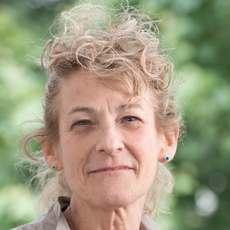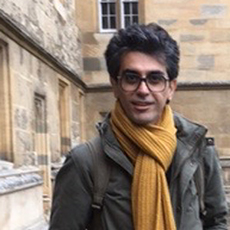Peter Adamson
Peter Adamson's is Professor of Late Ancient and Arabic Philosophy at the LMU in Munich. His primary areas of interest are late ancient philosophy and Arabic philosophy. His two monographs deal with the Arabic version of Plotinus, the so-called "Theology of Aristotle," and with al-Kindi (d. after 870 AD). He has devoted articles to several figures of the Greek tradition: Aristotle, Plotinus, and Porphyry; and numerous philosophers of the Arabic tradition, including al-Kindi, Abu Bakr al-Razi, Yahya Ibn 'Adi, Miskawayh, Avicenna, and Averroes. He has also edited several books including, most recently, "In the Age of Averroes" published by the Warburg Institute. In 2012 Prof Adamson moved to the LMU from King's College London, which is the home of a research project he oversees, on "Natural Philosophy in the Islamic World," funded by the Leverhulme Trust. He is also the host of the History of Philosophy podcast.
Natalia Chalisova
Natalia is a Deputy Director and Chief Research Fellow of the Institute for Oriental and Classical Studies at the National Research University “Higher School of Economics” in Moscow. She translated and researched the Persian treatises on the art of poetry (Rashīd ad-Dīn Waṭwāṭ. Hadā’iq al-siḥr. Introduction, translation into Russian, commentary (Moscow 1985); Shams-i Qays Rāzī, al-Muʿjam (Part II). Introduction, translation into Russian, commentary (Moscow 1997); she is also the author of the chapter on Persian Rhetoric in the General Introduction to Persian literature: A History of Persian Literature, ed. J. T. P. De Brujin, Vol. 1 (London and New York: I.B. Tauris, 2008) and of several articles on rhetorical figures in the Encyclopaedia Iranica (ed. by E. Yarshater). She is currently the chief of a research project on hagiographic narrative in Persian literature and culture whose goals include the study of the narrative patterns at the formative period of the Persian hagiographic life writing. She also participates in the “Russian Hafiz” project and is now co-editing the second volume, which will be published in the Orientalia et Classica Series of the Institute for Oriental and Classical Studies, following Vol. I of Hafiz. Ghazals in philological translation (Moscow, 2012, co-authored with N. Prigarina and M. Rusanov).
 Rita Copeland
Rita Copeland
Rita Copeland is Rosenberg Chair in the Humanities and Professor of Classics, English, and Comparative Literature. In addition to literature, her fields include the history of rhetoric and literary theory. Her publications include Rhetoric, Hermeneutics, and Translation in the Middle Ages; Pedagogy, Intellectuals and Dissent in the Middle Ages; Medieval Grammar and Rhetoric: Language Arts and Literary Theory, AD 300-1475 (with I. Sluiter); The Cambridge Companion to Allegory (with P. Struck), and most recently, the Oxford History of Classical Reception in English Literature, 800-1558. She is finishing a book called Emotion and the History of Rhetoric in the Middle Ages, and she is General Editor (with Peter Mack) of the forthcoming Cambridge History of Rhetoric.
Linda G. Jones
Lina is a Ramon y Cajal Research Professor at the Pompeu University in Barcelona. She is the author of The Power of Oratory in the Medieval Muslim World (New York: Cambridge University Press, 2012). She is the Principal Investigator of a research project funded by the Spanish Education Ministry and the European Regional Development Fund (Ref. no.: MINECO/FEDER, UE, FFI2015-63659-C2-2) whose goals include the comparative study of premodern Muslim, Christian, and Jewish preaching and transcultural interactions in and around the Mediterranean. She is currently co-editing a book based on the collective results of this research, which will be published in Brepols’ series Sermo. From 2014-2015, she was the recipient of a grant from the National Endowment for the Humanities to conduct research on her current book project, which is based on a unique manuscript of 14th-century Muslim hortatory sermons from the Crown of Aragon in Spain.
Todd Lawson
Todd is Professor Emeritus of Islamic Thought in the Department of Near and Middle Eastern Civilizations at the University of Toronto. He has published widely on Qur’anic exegesis, Shi’i Islam, and the writings of Sayyid ‘Alí Muhammad Shírází (d.1844), known to history as The Báb. His two most recent books are: Quran, Epic and Apocalypse (Oneworld 2017) and Intimacy and Ecstasy in Qur’án Commentary (Brill 2018). His two-volume study (co-edited with Sebastian Günther), Roads to Paradise appeared from Brill in 2016.
Cornelia Schoeck
Cornelia is Professor of Islamic Studies at the Faculty of Philology, Ruhr-University Bochum (Germany). Before that, she has also taught at the Universities of Freiburg i.Br., Kiel, Berlin. She has published monographs and articles on Islamic theology and Arabic logic including Adam im Islam: Ein Beitrag zur Ideengeschichte der Sunna (Berlin: Klaus Schwarz Verlag, 1993), Koranexegese, Grammatik und Logik (Leiden: Brill, 2006) and “Jahm b. Safwān (d. 128/745-46) and the ‘Jahmiyya’ and Ḍirār b. ʿAmr (d. 200/815)” in The Oxford Handbook of Islamic Theology, ed. by S. Schmidtke (Oxford: University Press, 2016). Together with Asad Ahmed (University of California, Berkeley) and Robert Morrison (Bowdoin, Maine) she is editor of Oriens: Journal of Philosophy, Theology and Science in Islamic Societies (Brill). She has been principal investigator of the project “Major issues and controversies of Arabic logic and philosophy of language” co-funded by the Deutsche Forschungsgemeinschaft and the British Arts and Humanities Research Council (principal investigator: Tony Street) and edited the collaborative Special Issue of Oriens 44.3-4 (2016) on Major Issues and Controversies of Arabic Logic.
Asghar Seyed-Gohrab
Ashgar is Associate Professor at Leiden University. His publications include The True Dream: Indictment of the Shiite Clerics of Isfahan, (London: Routledge, 2017, together with S. McGlinn); Soefism: Een levende traditie, (Amsterdam: Prometheus / Bert Bakker, 2015, third print); Literature of the Early Twentieth Century: From the Constitutional Period to Reza Shah (ed., London / New York: I.B. Tauris 2015), Layli and Majnun: Love, Madness and Mystic Longing in Nizami’s Epic Romance, (Leiden / Boston: Brill, 2003), Mirror of Dew: The Poetry of Ālam-Tāj Zhāle Qā'em-Maqāmi, (Cambridge: Harvard University Press, Ilex Foundation Series 14, 2015), Metaphor and Imagery in Persian Poetry, (ed., Leiden/Boston: Brill, 2012), The Great Omar Khayyam: A Global Reception, (ed., Leiden: Leiden University Press, 2012), Courtly Riddles: Enigmatic Embellishments in Early Persian Poetry, (Leiden: LUP, 2008, 2010). He has translated several volumes of modern Persian poetry into Dutch, including the poetry of Sohrâb Sepehri, Forugh Farrokhzâd, Mohammad-Rezâ Shafi’i-Kadkani, and (together with J.T.P. de Bruijn) Ahmad Shâmlu, Nâder Nâderpur, and Hushang Ebtehâj. He is the founding general editor of the Iranian Studies Series at Leiden University Press and the Modern Persian Poetry Series.
Kayvan Tahmasebian
Kayvan Tahmasebian is a Marie-Curie Fellow at the University of Birmingham, and Principal Investigator of Transmodern, a Horizon 2020-funded project on the position of translated literature within modern Iranian literary theory. He is a poet, translator, literary critic, the author of Isfahan’s Mold (2016) and Lecture on Fear and Other Poems (2019), and the co-editor of Routledge Handbook of Translation and Activism (2020). Currently he is working on his book manuscript Untranslatable Modernity: The Invention of Iranian Modernism. With Rebecca Ruth Gould, he is co-translator of High Tide of the Eyes: Poems by Bijan Elahi (The Operating System, 2019). His work has appeared in or is forthcoming in Wasafiri, Modernism/Modernity, Representations, and The Kenyon Review.